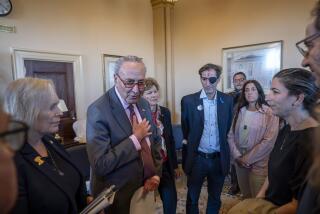Church to Air Kidnap Victim’s Plea : Weir Family Assails U.S. Failure to Free Missionary
- Share via
National leaders of the Presbyterian Church, frustrated by the State Department’s failure to obtain the release of a missionary abducted nearly 10 months ago in Beirut by Islamic terrorists, announced plans Monday to mount a campaign to flood the White House with a million letters within the next two weeks.
Church officials received two handwritten letters from the hostage, Benjamin Weir, 61, on Feb. 27 and 28, urging “the U.S. government to take strong, effective action to get Weir and the other hostages out,” said J. Oscar McCloud, general director of the Presbyterian Church (U.S.A.), at a meeting of the church’s General Assembly Council in San Diego.
Church officials said that after waiting 10 months for the State Department to free Weir through diplomatic channels, they have decided to mount their own campaign urging President Reagan to negotiate his release. “The period of quiet has ended for us,” McCloud said. “We are hoping for a more intensive effort. We would like to see him home tomorrow.”
Weir, who has performed Presbyterian missionary duties in Beirut for 32 years, was abducted by three men while walking with his wife from their house last May 8.
Members of the Islamic Jihad (Islamic Holy War), a Shia Muslim terrorist organization loyal to Iran, are believed to be responsible for kidnaping Weir and four other men, including journalist Jeremy Levin, who escaped Feb. 13, after 11 months of captivity.
The three missing Americans, believed to be held with Weir in the Bekaa Valley in Lebanon, are diplomat William Buckley; Father Lawrence Jenco, head of the Beirut office of Catholic Relief Services, and Peter Kilburn, a librarian at the American University of Beirut.
McCloud, to whom one of the letters was addressed, said their contents cannot be released until he and Weir’s wife, Carol, and son, John, meet Friday in Washington with Secretary of State George P. Shultz.
But the Weirs and church officials have decided to disregard State Department advice to keep Weir’s letters secret, McCloud said.
McCloud urged the assembly of 200 clergy and lay leaders to approach their elected officials and to ask their congregations to begin sending letters to the White House.
“We have been very cooperative with the State Department for a year,” McCloud said. “But there has been no progress and we must try a new tactic.”
Carol Weir said she believes the abductions and recent letters from her husband are desperate cries for help from the Lebanese, who she said are oppressed by the U.S.-aided Israeli forces.
“They (the Lebanese) have legitimate grievances,” Mrs. Weir said. “The terrorists represent a people who are suffering and they are making desperate attempts to be heard by the U.S.”
Mrs. Weir, who had been living quietly in Beirut since her husband’s abduction, said she returned to the United States in mid-February to appeal to officials in Washington to work for her husband’s release.
Her March 15 meeting with Richard W. Murphy, assistant secretary of state for Near Eastern and South Asian affairs, yielded “nothing substantive,” she said, and other receptions have been “cool.”
“The government has told me they are working carefully and slowly,” Mrs. Weir said. “I do accept carefully, but I do not accept slowly.”
She said the Rev. Jesse Jackson, who last year negotiated the release of Lt. Robert O. Goodman Jr., a Navy flier being held by Syria, has responded affirmatively to her plea for help--should the State Department fail to act promptly.
“I want the U.S. to open up every diplomatic channel to get Ben released,” Mrs. Weir said. “Our government needs to recognize the terrorists’ grievances and they (U.S. officials) cannot afford to lose the interest and momentum gained by Levin’s release.”
John Weir, 27, said he also is frustrated and disappointed at the State Department’s failure to act directly on behalf of the hostages.
“I expected them to be more responsive to our pleas,” he said. “The release of these men is not a high enough priority with them.”
More to Read
Sign up for Essential California
The most important California stories and recommendations in your inbox every morning.
You may occasionally receive promotional content from the Los Angeles Times.













